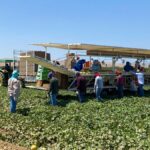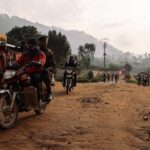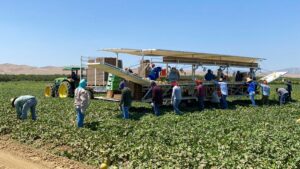
Los Angeles, California — Recent raids carried out by the United States Customs and Border Protection (CBP) in a rural California county have struck fear into immigrant communities as President-elect Donald Trump prepares to return to the White House.
CBP says that the operation in Kern County, which took place over three days in early January, resulted in the detention of 78 people. The United Farm Workers (UFW) union says it believes the number is closer to 200.
“The fields were almost solitary the day after the raids,” a 38-year-old undocumented farmworker named Alejanda, who declined to give her last name, said of the aftermath.
She explained that many workers stayed home out of fear. “This time of year, the orchards are usually full of people, but it felt like I was by myself when I returned to work.”
The raids are being seen by local labourers and organisations like UFW as a shot across the bow from immigration enforcement agencies before Trump’s inauguration on Monday.
His second term as president is expected to ring in a new era of enhanced restrictions and deportation efforts.
Advertisement
While the number of people arrested represents a small fraction of the hundreds of thousands of undocumented workers underpinning California’s agricultural sector, the anxieties caused by such raids extend far beyond those detained.
“On Wednesday [the day after the raids], I stayed home from work. I barely left my house,” said Alejanda, adding that she kept her five-year-old son home from daycare rather than risk driving to drop him off.
“Everyone is talking about what happened. Everyone is afraid, including me. I didn’t actually see any of the agents myself, but you still feel the tension.”
Emboldened agencies
Following a presidential campaign where he routinely depicted undocumented migrants as “criminals” and “animals”, Trump will likely try to fulfill his promise to carry out the “largest deportation programme” in the country’s history on his first day in office.
About 11 million people live in the United States without legal documentation, some of whom have worked in the country for decades, building families and communities.
The January arrests in Kern County appear to be the first large-scale Border Patrol raid in California since Trump’s victory in the November election, which set off speculation about the potential impact of mass deportations on immigrant communities and the economic sectors dependent on their labour.
About 50 percent of California’s agricultural workforce is made up of undocumented immigrants.
In California, undocumented status has been cited as a source of persistent anxiety for workers — as well as a means of leverage for employers, who often pay such labourers lower wages and grant them fewer protections in the fields.
Advertisement
But Alejanda says that workplace raids like the ones that took place in Kern County have not been common in the area.
“I have been here for five years and never experienced anything like this before,” she said, noting that workers were detained while leaving the fields to go home.
CBP said in a statement that the operation, named “Return to Sender”, had targeted undocumented people with criminal backgrounds and connections to criminal organisations.
#WeFeedYou pic.twitter.com/8e6GE9RRkK
— United Farm Workers (@UFWupdates) January 11, 2025
The raids were carried out by agents from the CBP El Centro Sector, located near the border between Mexico and southern California, more than five hours by car from the site of the raids.
“The El Centro Sector takes all border threats seriously,” Chief Patrol Agent Gregory Bovino said in a press release. “Our area of responsibility stretches from the US/Mexico Border, north, as mission and threat dictate, all the way to the Oregon line.”
Antonio De Loera-Brust, a spokesperson for UFW, said that the operation shows that agencies like CBP are likely to become more aggressive as Trump takes office.
He also disputed CBP’s characterisation of the raids as focused on people with criminal records, saying that the operation cast a wide net and profiled people who looked like farmworkers.
Two of those arrested were UFW members, whom the organisation described as fathers who had lived in the area for more than 15 years.
“By operating over 300 miles north of the Mexican border, and apparently conducting this untargeted sweep based on profiling on their own initiative and authority, Border Patrol has shown itself to be clearly emboldened by a national political climate of hostility towards hard-working immigrant communities,” De Loera-Brust told Al Jazeera.
Advertisement
“It’s certainly deeply concerning that this sort of operation could be the new normal under the incoming Trump administration.”











More Stories
Man Utd vs Brighton preview: Kickoff time, team news, how to follow, stream
Israeli cabinet approves Gaza ceasefire deal with Hamas
Gaza atrocities will ‘haunt’ Antony Blinken, says former US diplomat